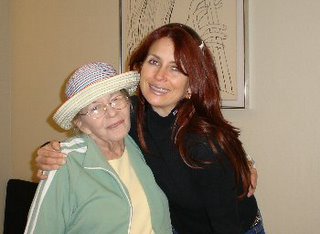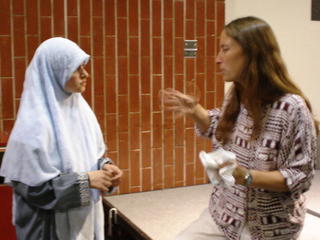La Fondue owner Tracey Cutler finds time to help a 78-year-old woman

By Laura Rheinheimer
Tracey Cutler describes her life as “very busy.” She and her husband Mitchell own and operate La Fondue restaurant in Saratoga, parent two teenagers (ages 15 and 17), and travel often to Israel and other exotic destinations. Yet Tracey still manages to integrate volunteering into her hectic schedule. She says a big part of her life is helping others in whatever small ways…
“What small ways?” interjects 78-year-old Eleanore Prisant, with the attitude of a Jewish grandmother, “it’s not a small way. You help me in big, big ways.”
Tracey helps Eleanore as part of a volunteer program through Jewish Family Services of Silicon Valley called “Friendly Visitors.” The program offers companionship to the elderly and help with small chores, such as paperwork and shopping. In some instances - like with Tracey and Eleanore - the relationship flourishes into much more.
Tracey had been volunteering for years with a large organization when she decided to respond to an email advertisement for the Friendly Visitors program.
“I really felt more compelled [to help someone one-on-one]” she said. Now, Tracey describes the relationship with Eleanore like that of a mother and daughter. Both women say they felt an immediate connection.
Tracey has cleaned Eleanore’s apartment, driven her to the hospital, celebrated her birthday, bought her gifts, and signed her up for a class at the Jewish Community Center.
Tracey teases that she is still trying to get Eleanore to La Fondue.
“I wasn’t expecting [anything], but she did everything for me,” said Eleanore.
Avital Agam, a social worker with Jewish Family Services, says that not all matches work out this well. When they do, it is a gift. “Eleanore calls her ‘her angel,’” said Avital.
“Eleanore has shown and taught me a lot [too],” Tracey says, describing how Eleanore has stayed positive with a “beaming personality,” even through tough times.
“Beaming,” teases Eleanore.
Legally blind with no family in the area, Eleanore lives independently but needs help with driving, shopping, cleaning and other chores. In her adult life, she worked as an analytical chemist. Her training came from Hunter College in New York, where she graduated in 1949 with a chemistry degree. Work in the field never came easily, Eleanore recounts, as very few women worked as chemists and men were not terribly interested in opening their doors.
“I suspect being Jewish didn’t help,” said Avital Agam.
Eleanore takes a class now at the JCC on the history of Jews in the U.S., called “Coming to America.” This helps keep her brain sharp, and stay connected socially. Eleanore said she was not active in the Jewish community, but always felt connected, “because I’m Jewish.”
Anyone interested in getting involved with “Friendly Visitors” or other volunteer programs, contact Avital Agam at Jewish Family Services, 357-7450 or avitala@jfssv.org.

